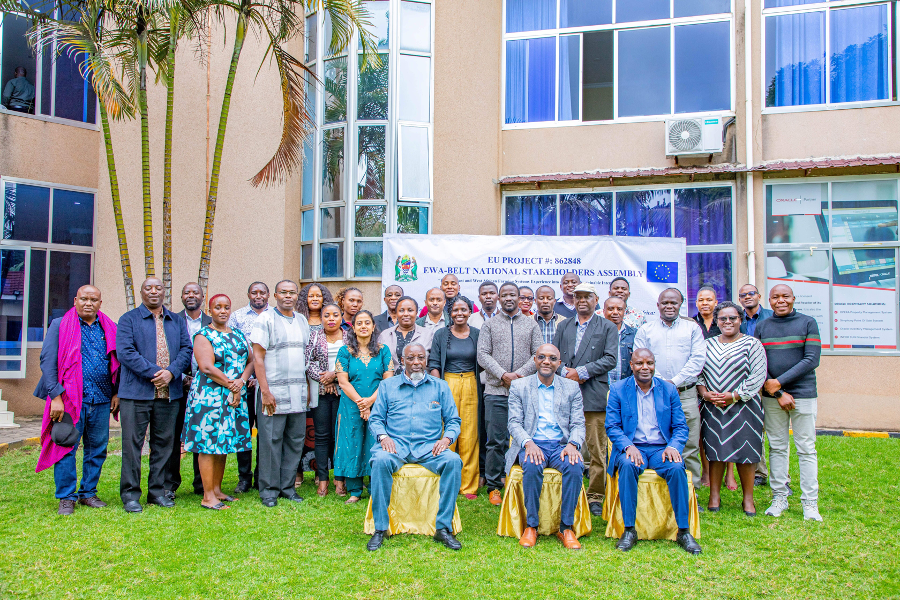Unlocking the Potential of Neglected and Underutilized Species (NUS) for Sustainable Agriculture within the SUSTLIVES Project.
- OCCAM - Observatory on Digital Communication

- Nov 15, 2024
- 3 min read
As part of the First Session of the EWA-BELT General Assembly, held in Milan on September 24, 2024, Dr. Hamid El Bilali, from the Mediterranean Agronomic Institute (CIHEAM) illustrated the activities related to the Neglected and Underutilized Crop Species (NUS) and the sustainable agri-food system within the framework of the SUSTLIVES project undergoing in Niger and Burkina Faso.

In recent years, the Neglected and Underutilized Crop Species (NUS) have gained attention for their role in promoting sustainable agriculture, climate resilience, and food security. In this regard, although more than 250,000 plant species exist globally, only a small fraction - around 7,000 species - are commonly used for food, with just a handful of staple crops like wheat, rice, and maize supplying the majority of the world’s calories. This reliance on a narrow group of crops leaves global food systems vulnerable to climate change and other environmental shocks.
In this view, the SUSTLIVES project, funded by DeSIRA and active in Niger and Burkina Faso, is working to change this narrative, focusing on NUS in order to diversify food sources, bolster local agriculture, and improve nutrition and food security in rural communities, exploring how NUS can enhance the resilience of agri-food systems in West Africa.
Dr. El Bilali, from CIEHAM, first illustrated how NUS are sometimes called “orphan” or “minor” crops because they receive minimal attention from policymakers, researchers, and the agricultural industry. However, these species hold unique advantages, as some of them are well-adapted to difficult environmental conditions, require fewer inputs, and support biodiversity. Furthermore, NUS often have high nutritional value, making them ideal for addressing both dietary diversity and the “hidden hunger” caused by micronutrient deficiencies.
Dr. El Bilali then showcased how, compared to staple crops, NUS frequently contain higher levels of essential vitamins, minerals, and other nutrients, which can help address malnutrition in regions where dietary diversity is limited. In addition, from the economic side, NUS can provide low-cost production options for smallholder farmers, requiring fewer resources than major crops and yielding resilient harvests even under challenging conditions. Moreover, NUS are often grown and marketed by women, empowering them through new income opportunities and fostering gender equality within agricultural communities.
The SUSTLIVES Project was launched in August 2021 with a four-year timeline and a budget of 6 million euros. The project’s overarching goal is to promote climate-resilient agri-food systems by enhancing the use of local agrobiodiversity in Burkina Faso and Niger, specifically through NUS. Dr. El Bilali explained how the project is organized around several key components designed to support NUS research, training, policy development, and community engagement.
In this regard, SUSTLIVES generates and consolidates data on NUS, establishing seed banks, mapping NUS value chains, and sharing knowledge with local stakeholders through forums. These activities address the fragmented data on NUS and promote their potential within the agricultural sector. In this view, over 20 sessions have been held in Burkina Faso and Niger, covering topics such as seed conservation, value chain development, and agronomic practices. Participants benefit from workshops, on-the-job coaching, and internships in Italy and Finland.
Dr. El Bilali highlighted how SUSTLIVES aims to create a supportive policy environment for NUS by analyzing existing policies and advocating for the inclusion of these species in national agricultural strategies. The project also collaborates with other EU-funded initiatives within the DeSIRA framework to strengthen regional partnerships. In this regard, the project has established an experimental station at the Faculty of Agriculture of the University of Niamey and additional research sites in Burkina Faso.
To conclude, Dr. El Bilali finally mentioned some challenges NUS are experiencing in gaining mainstream acceptance. Among these, limited data, fragmented knowledge, low capacity among agricultural actors, and a lack of supportive policies are ongoing obstacles. The SUSTLIVES project aims to overcome these barriers by bridging the gap between research and practice, involving local stakeholders, and building strong partnerships.
The SUSTLIVES project exemplifies the growing recognition of NUS as essential resources for achieving the 2030 Agenda and the Paris Agreement. By promoting the resilience and diversity that NUS bring to agri-food systems, SUSTLIVES is helping to build a more secure and sustainable future for communities in Burkina Faso, Niger, and beyond.
Follow us on social media to stay up to date!
EWA-BELT Project |
Website: www.ewabelt.eu Facebook: ewabelt.project Instagram: ewabelt_project X: ewabelt_project LinkedIn: showcase/ewa-belt YouTube: occam3039 Joint YouTube channel: @sfs35 |
For media inquiries, please contact:
OCCAM - Observatory on Digital Communication





Comments